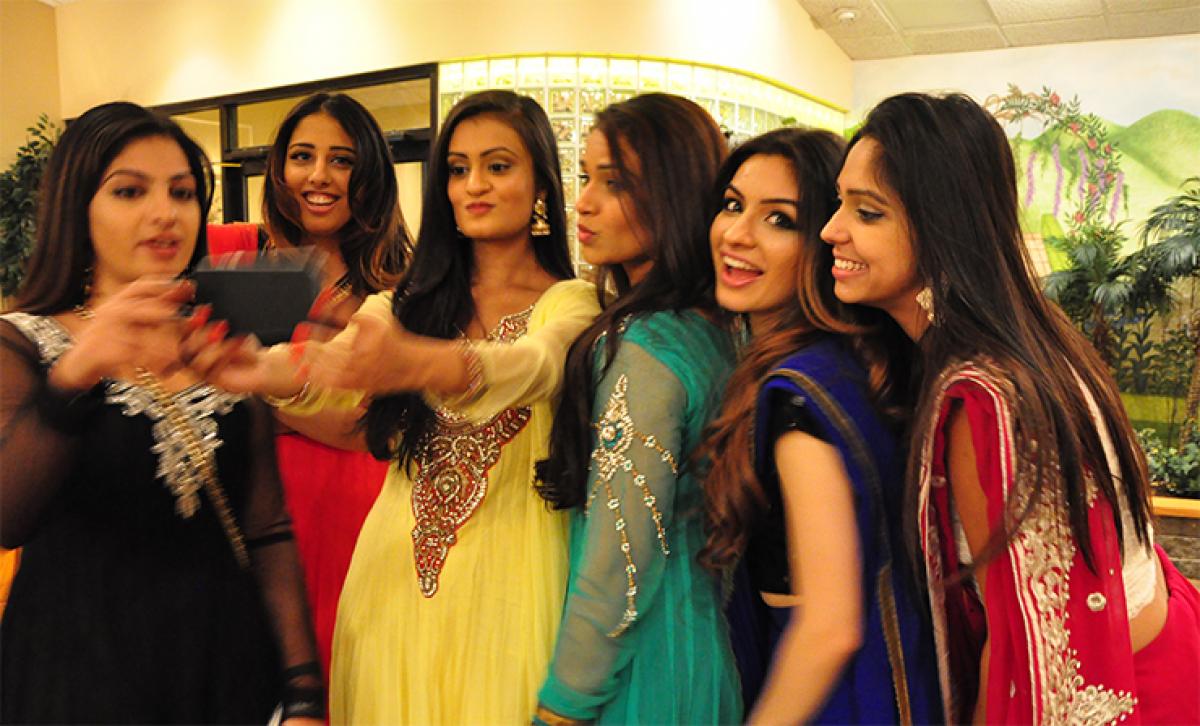Live
- District Collector Conducts Surprise Inspection, Ensures Quality Meals for Students
- Call to End Exploitation of Cotton Seed Farmers by Middlemen in Gadwal District
- BJP Demands Immediate Action on Failing Mid-Day Meal Scheme and Infrastructure in Jogulamba Gadwal Schools
- CPM Demands Immediate Action to Strengthen Government Hospitals and Curb Private Healthcare Exploitation
- 6 Startups Shaping the Future of Faith-Tech in India
- Unfazed by numbers; Raashi shines with her appearance
- Samantha: Actress Samantha's Father Joseph Prabhu Passes Away
- Mokshagnya’s dashing transformation ignites curiosity among fans
- Allari Naresh goes massy in ‘Bachhala Malli’teaser
- Kichcha Sudeep’s ‘Max’locks release date
Just In

If you are among those parents who are constantly worried about your young ones being occupied with selfies, the moment you are out on a family dinner or holidaying, brace yourself for worse to come. Selfie phones and selfie sticks are no longer just a convenience but considered the new symbol of self-absorption, say experts, adding that the selfie fever can further isolate this generation and those to come.
New Delhi: If you are among those parents who are constantly worried about your young ones being occupied with selfies, the moment you are out on a family dinner or holidaying, brace yourself for worse to come. Selfie phones and selfie sticks are no longer just a convenience but considered the new symbol of self-absorption, say experts, adding that the selfie fever can further isolate this generation and those to come.

Megastar Amitabh Bachchan recently said he was left disgusted by the insensitivity of young fans who surrounded him and began clicking selfies while he was attending the cremation of a friend. "Disgusting! No respect for the departed, or for the moment," Bachchan later posted in a tweet. "If Big B is disgusted, he is not alone. Recently, I saw a teenager who took selfie with his friend's mother who was on ventilator and posted it on Facebook.
This is such a stony-hearted approach," laments Dr Madhuri Singh, consulting psychiatrist at Nanavati Super Speciality Hospital in Mumbai. "The selfie craze is pulling sensitivity out of Indian teenagers' minds," she told IANS. For Dr (Brig) S. Sudarsanan, senior consultant psychiatrist at BLK Super Speciality Hospital in New Delhi, taking selfies on sad or solemn occasions is certainly an uncultured behavior and needs to be discouraged.
"I would still not consider selfie behavior as an addiction, which implies many other behavioral changes like craving, withdrawal symptoms, disregarding all other interests, relationships and activities. But, yes, excessive or extremes of such behavior warrant counselling," he said. The behavioral experts have divided selfies into three broad categories - those taken with friends, those taken during certain activities or events and those that focus on physical appearance.
A recent study, appearing in the journal Psychology of Popular Media Culture, found that people who posted a lot of selfies tend to have higher levels of certain narcissistic traits such as fragile self-esteem. "An excessive dependence to the extent of becoming preoccupied with the social need of posting these selfies at regular intervals can be detrimental to the psychological and social well-being of teenagers," elaborates Dr Samir Parikh, director (mental health and behavioural science) at Fortis Hospital.
"The selfie culture tends to deprive youth of social stimulation, becoming more and more engulfed in the virtual and technological world of the media. Such excessive preoccupation can also lead to social withdrawal and alienation," Dr Parikh warns. Dr Singh lists three major negative impacts of selfie obsession. "Teenagers who are not born with good looks can develop inferiority complex.
Second is the growing insensitivity among youngsters and preoccupation with selfies most of the time is bad for mental health too," she explains. Recently in Mexico, a young medical student, dressed in uniform with a stethoscope around her neck, took a smiling selfie next to a seriously-ill elderly woman lying on the bed. Her WhatsApp post read: "I was on duty and saw a lady was dying and then took a selfie".
The post quickly went viral on the social media, slamming her lack of sensitivity to the right of a sick patient. A while ago, the news after a Venezuelan student obstetrician sparked outrage who posted a selfie in front of a woman in labour. He cheekily captioned the selfie with, "Lady I can deliver your baby but first let me take a selfie". Instead of simply restricting or prohibiting the use of selfies, feel experts, it is necessary for both parents and teachers to educate the youth about the selfie culture and the various factors associated with the social learning.
"Making the children and adolescents media literate is a necessity today in order to ensure a more balanced approach towards the use of the social media," Dr Parikh emphasises. "Consult the expert if you feel there is a need for intervention," adds Dr Ashish Mittal, consultant psychiatrist at Columbia Asia Hospital in Gurgaon. "Treat selfies only as a fun activity," Dr Sudarsanan advises.
By: Nishant Arora

© 2024 Hyderabad Media House Limited/The Hans India. All rights reserved. Powered by hocalwire.com







